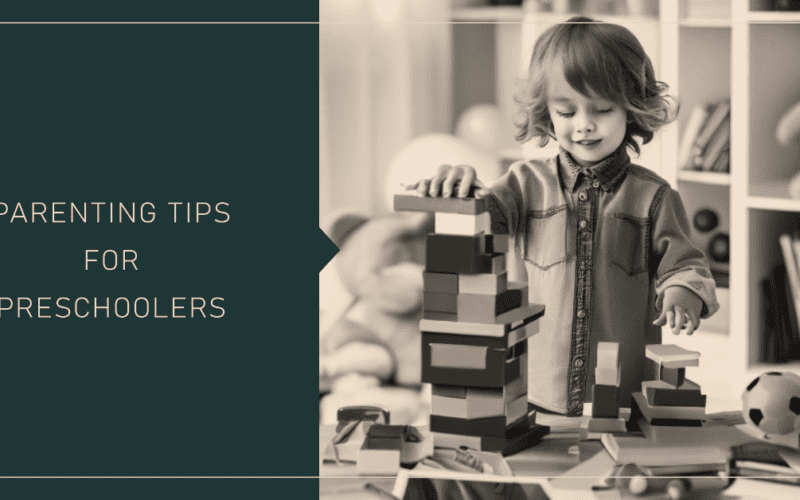Parenting Tips For Preschoolers

Parenting preschoolers can be a challenging stage, but it can also be filled with wonderful moments. With the right strategies in place, you can create a positive and safe environment for your child to learn and grow.
You’ll learn specific tips for:
- Establishing routines
- Managing emotions
- Using positive discipline
- Promoting self-regulation
- Fostering independence
- Encouraging positive social interactions
With these tools, you can create a positive and supportive home environment to help your child thrive. Let’s get started!
Learn how to set boundaries with kids →
Establishing Routines
Establishing routines can help young children develop a sense of security and stability in life. Setting the same bedtime and wake-up times, and having regular mealtimes can help preschoolers feel secure in their environment.
It’s also important to create a daily routine that includes time for play, rest, and learning. A regular routine will help children learn to recognize and follow rules, and will also help them feel comfortable with expectations.
Other than daily routines, it’s important to set boundaries and expectations for preschoolers. This helps them understand what is expected of them, and develop a healthy respect for authority.
Setting consistent rules and expectations can help young children learn to cooperate, share, and follow directions. As a parent, it’s important to be consistent and firm in enforcing these rules and expectations. This will help them form long-term habits that will serve them as they grow up.
Managing Emotions
Managing emotions can be an exciting journey! Here are a few tips to help your child regulate their emotions:
- Provide a safe environment for your child to express their emotions. Allow them to vent without judgement and offer encouragement.
- Help your child to recognize their emotions through facial expressions and body language. Use books, songs, and stories to help them learn more about their feelings.
- Model positive behavior by showing your child how to cope with difficult situations. This will help them build better problem-solving skills.
By teaching your little one to manage their emotions, you can help them build better self-regulation and communication skills. It’s also an opportunity to build a stronger bond with your child and nurture their emotional development.
Positive Discipline Strategies
Disciplining your child in a positive way can have a lasting impact on their development. For example, when your toddler throws a temper tantrum, instead of punishing them with a timeout, try listening to their feelings and helping them find a better way to express themselves.
Positive discipline strategies focus on teaching your preschooler the skills they need to become successful. This includes setting expectations and age-appropriate rules, offering positive reinforcement for good behavior, redirecting misbehavior in a constructive way, and providing consistent consequences for bad behavior.
| Positive Discipline | Negative Discipline |
|---|---|
| Praise good behavior | Punish or yell |
| Set expectations | Ignore bad behavior |
| Redirect behavior | Make threats |
| Consistent limits | Loss of privileges |
Promoting Self-Regulation
Encouraging self-regulation in your toddler is vital for their long-term success, so be sure to focus on positive strategies that’ll help them learn to manage their emotions and behaviors.
Self-regulation skills are important for children to learn in order to help them succeed in school and beyond. By providing a consistent routine and clear expectations for behavior, you’ll be helping your toddler understand how to self-regulate.
You can also model appropriate behavior for your toddler by using calming strategies when you’re feeling overwhelmed or frustrated. Encourage your toddler to use deep breathing or counting to 10 when they’re feeling overwhelmed. Show them that it’s okay to take a break and ask for help.
When your toddler expresses emotions, be sure to validate them and help them understand their feelings. This’ll help them learn how to cope with difficult emotions and situations.
Fostering Independence
Fostering independence in your toddler is an important part of their development, so it’s important to give them the opportunity to practice doing things on their own.
It’s ok to start small, allowing your toddler to select their own clothing for the day or to help them learn to brush their own teeth. As they become more confident, you can give them more independence, such as allowing them to dress themselves or helping them learn to tie their own shoes.
It’s important to give them the time and space to practice and make mistakes. It’s also important to be patient with them and to celebrate their successes. Doing so will help them to build a sense of self-efficacy, which will help them to become more independent and resilient.
Encouraging Positive Social Interactions
It’s essential for toddlers to learn how to interact positively with their peers, and research shows that up to 79% of a child’s social and emotional development happens before age five.
As a parent, it’s your job to foster positive social interactions for your preschooler. Here are some tips to help you do that:
- Teach your child to communicate clearly and assertively
- Model positive social interactions
- Praise your child for being a good friend
- Be aware of your child’s emotional state and intervene when needed
- Provide opportunities for your child to engage in group activities
- Encourage your child to take initiative in building relationships with others.
Frequently Asked Questions
How do I get my preschooler to follow a routine?
Establishing a routine for your preschooler can help them develop good habits and self-discipline. Start by creating a schedule that outlines when your child should wake up, eat meals, do activities, and go to bed.
Make sure to include time for play and outdoor activities as well. Involve your child in creating the routine so they understand why they’re doing it.
Once the routine is established, provide reminders and positive reinforcement to help your child stay on track.
How can I help my preschooler understand and manage their emotions?
Helping your preschooler understand and manage their emotions is important for their growth and development. Start by talking to them about their feelings in an open and understanding way. Encourage them to express their emotions constructively and give them strategies to regulate their emotions.
Make sure to model healthy emotional management yourself so they can learn from your example.
What are some effective discipline strategies for preschoolers?
Do you want to know how to effectively discipline your preschooler? It can be challenging, but there are some strategies that can help.
Start by being consistent, using the same rules every time and enforcing them every time.
Give your child choices, so they can learn to make decisions for themselves.
Remember that praise and positive reinforcement go a long way, and use words that empower your child.
Finally, try not to punish your child too harshly, as this can be damaging to their self-esteem.
So, how can you effectively discipline your preschooler?
How can I help my preschooler learn to self-regulate?
Helping your preschooler learn to self-regulate can seem daunting, but it’s possible with consistent effort and patience.
Start by teaching your child techniques to recognize and manage their emotions, such as deep breathing, counting to 10, or writing down their feelings.
You can also provide them with a safe place to practice self-regulation, like a designated ‘calm corner,’ where they can take a break from a stressful situation.
Modeling self-regulation yourself and providing positive reinforcement when your child is successful can also help them learn and practice these skills.
What are some ways to foster independence in my preschooler?
Encouraging your preschooler to be independent will help them develop confidence and problem-solving skills. Start by setting small, achievable goals for them. For example, allow them to dress themselves and brush their teeth. You can also involve them in simple tasks like setting the table.
Over time, give them more responsibility and offer them choices. Explain why certain decisions are better than others and encourage them to make their own decisions as much as possible. It’s important to allow them to make mistakes and be patient with them as they learn.
Conclusion
You’ve done an amazing job getting your preschooler to this point. With the right strategies and techniques, you can continue to foster their growth and development.
Research shows that 93% of parents report feeling more confident in their parenting skills after implementing positive discipline. You can join the ranks of these parents and help your child reach their full potential.
With your guidance and support, your preschooler will have a strong foundation for success in the future.









